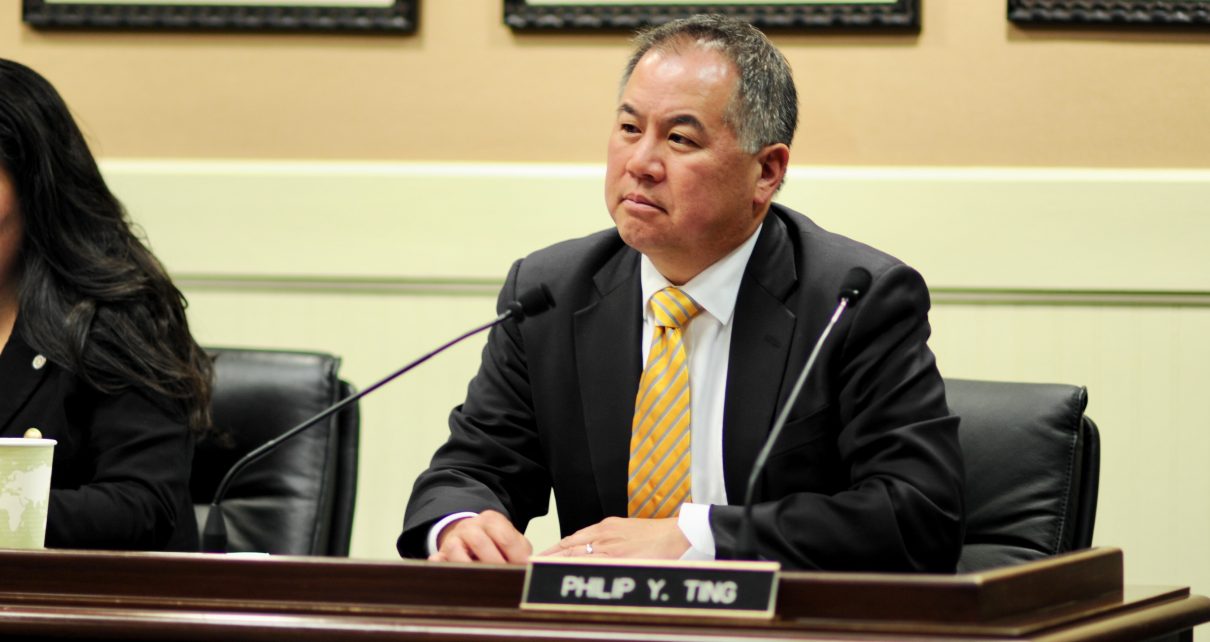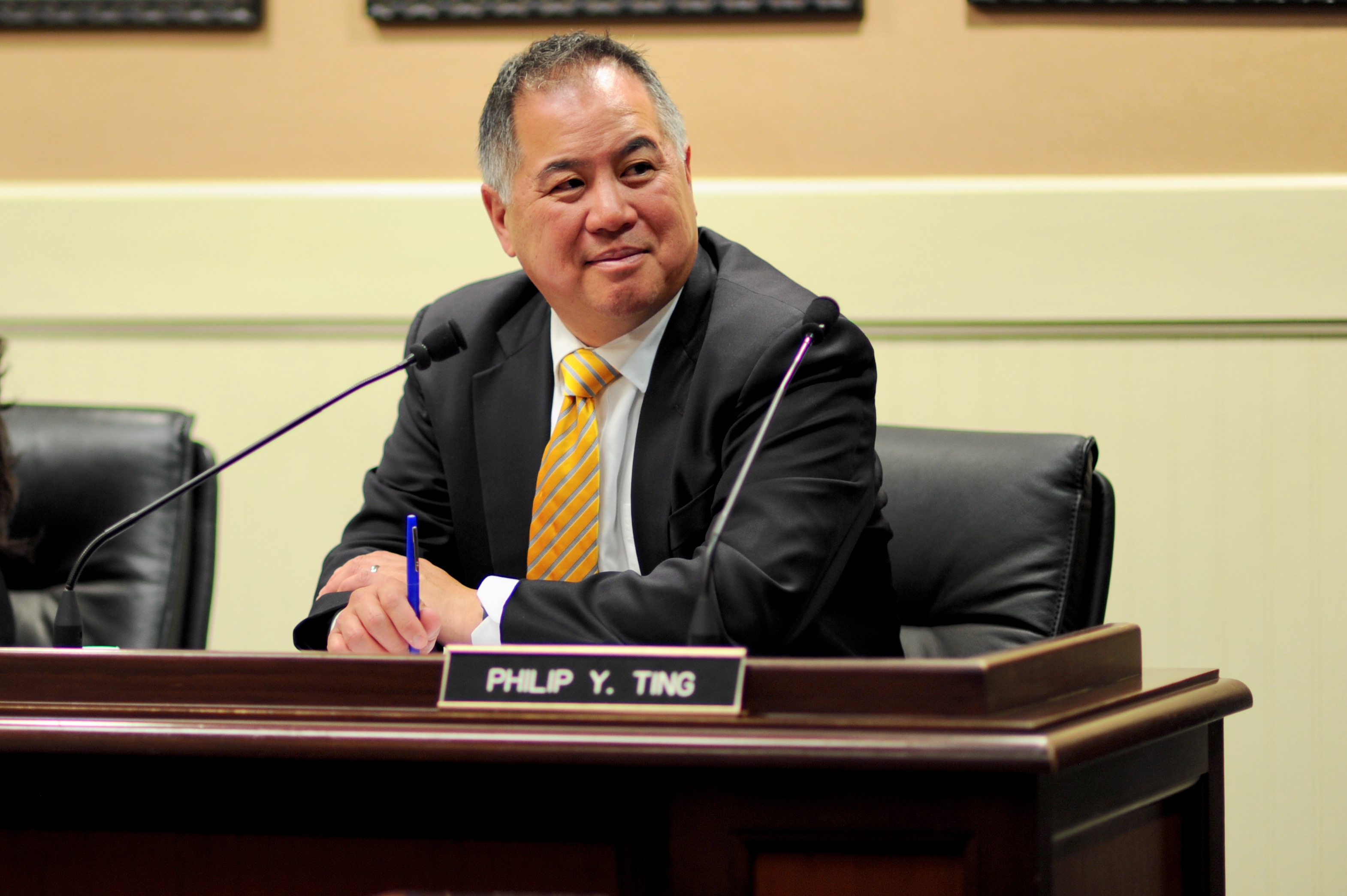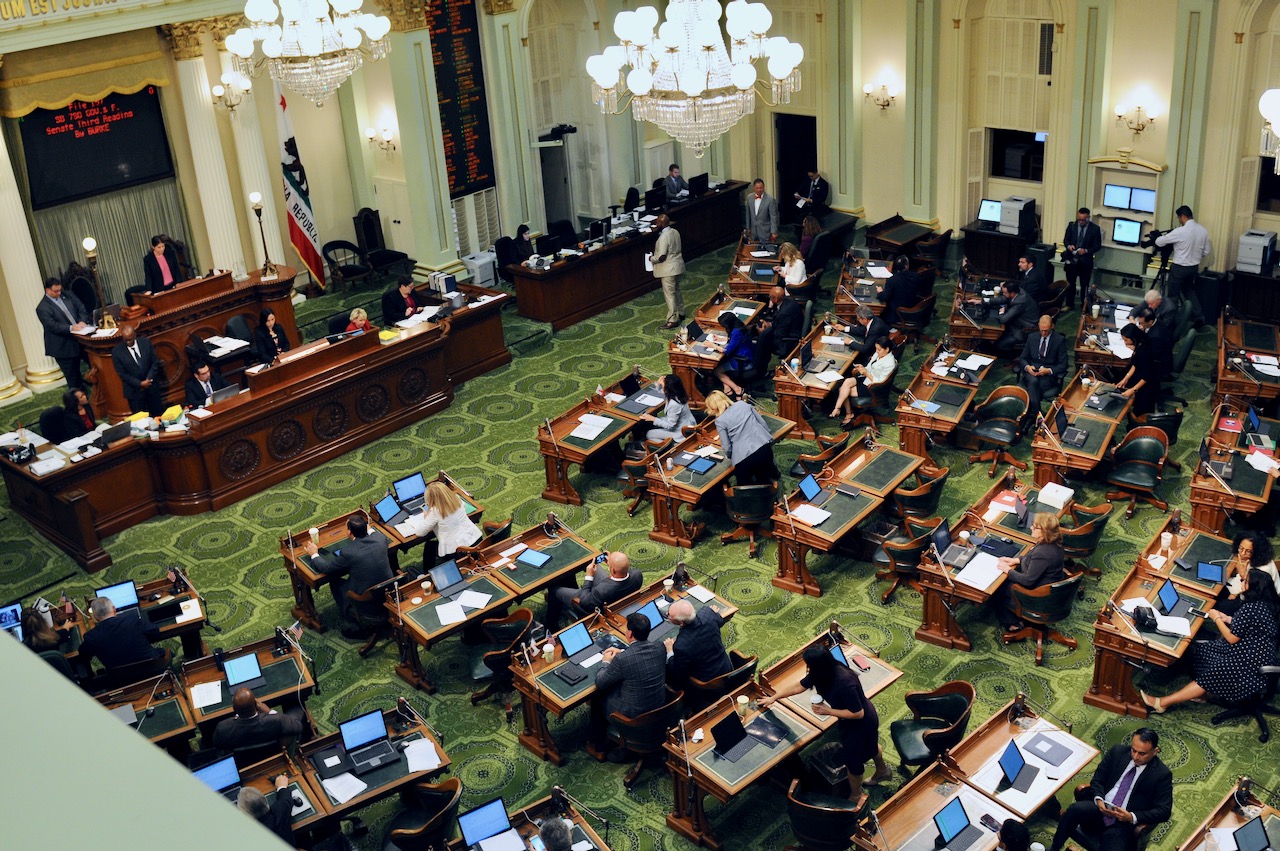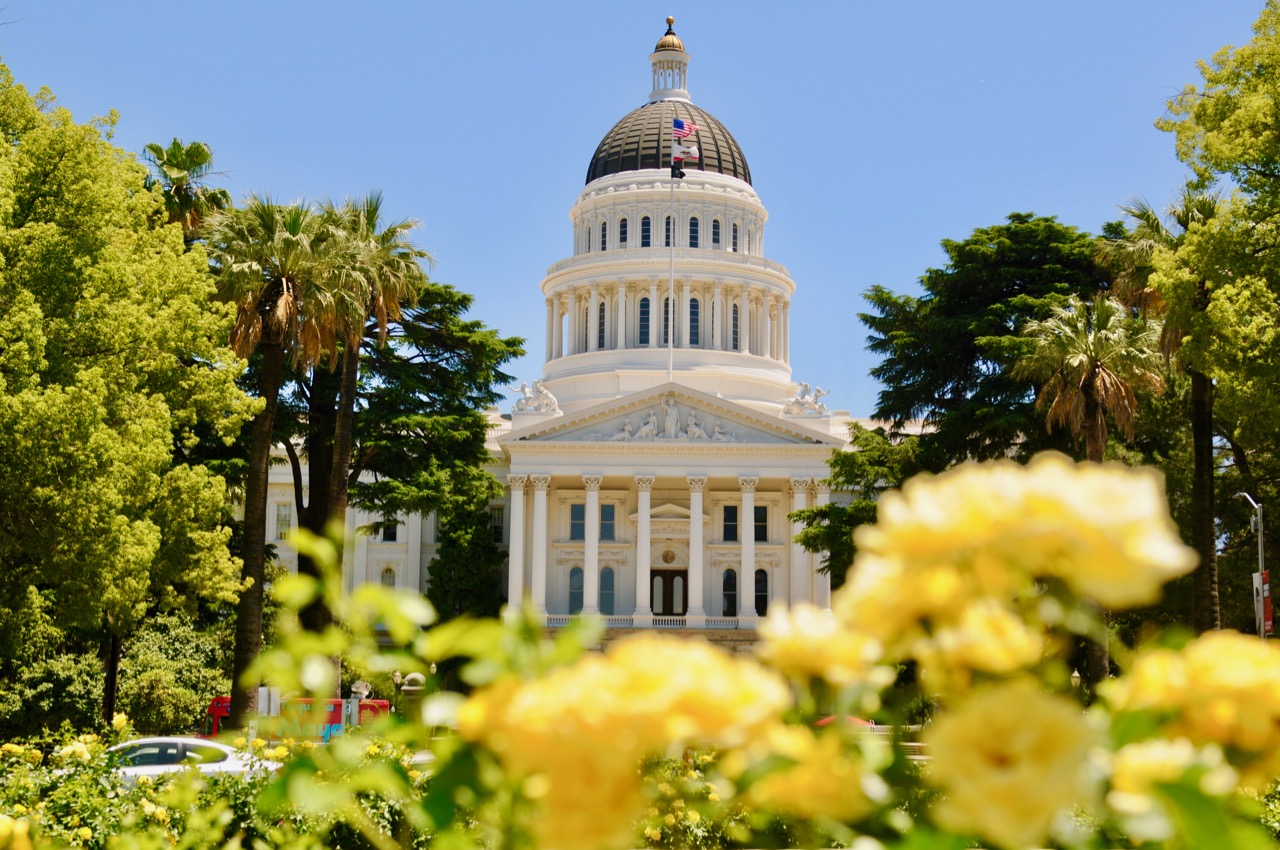
Assemblyman Philip Y. Ting. (Photo: Kevin Sanders for California Globe)
Bill To End Legacy and Donation-Based Admissions To California Colleges Passes Assembly
AB 1780 covers private, public institutions
By Evan Symon, May 24, 2024 9:00 am
A bill that would ban both legacy and donor preferred admissions at public and private colleges in California passed in the Assembly earlier this week, moving the bill onto committees in the Senate.
Assembly Bill 1780, authored by Assemblyman Phil Ting (D-San Francisco), would prohibit an independent institution of higher education from providing a legacy preference or donor preference in admissions to an applicant as part of the regular or early action admissions process. The bill would make a violation of the prohibition subject to a civil penalty equal to the amount the independent institution of higher education receives in the year before the violation occurred pursuant to the Cal Grant Program or the Cal Grant Reform Act. AB 1780 would also require the civil penalty to be assessed and recovered by the Department of Justice and deposited into the Cal Grant Account, which the bill would establish in the State Treasury.
In addition, the bill would require funds in the account, upon appropriation by the Legislature, to be available for purposes of funding the Cal Grant Program or the Cal Grant Reform Act, as well as require the department to post the names of the independent institutions of higher education that violate the prohibition on its internet website. Finally, AB 1780 would require, on or before June 30, 2026, and annually thereafter, an independent institution of higher education to report specified information about admitted students to the Legislature.
Ting wrote the bill in response to some recent shakeups to admissions criteria in colleges caused by the Varsity Blues admissions bribery scandal and last years Students for Fair Admissions v. Harvard Supreme Court case which virtually banned affirmative action in college admissions. Both incidents caused legacy and donor preferred admissions to grow, with Stanford’s newest class being over 13% legacy and USC 14% legacy. Top colleges also are less racially diverse due to legacy admissions, with white and Asian students getting more slots in recent years.
Ting argued that college admissions must be made equal again, with admission not being dependent on a big donation being made or having family gone there before. The Assemblyman also argued that if race doesn’t matter anymore for admissions because of the Supreme Court decision, neither should money or family connections.
“Everyone should be considered fairly,” said Ting in a statement on Tuesday. “If you work hard, get good grades and have a well-rounded background, your spot should not be taken by someone else just because their family can write a big check or is a graduate of that school. If we value diversity in higher education, we must level the playing field. That means making the college application process more fair and equitable.
“I think the irony with legacy admissions is legacy admissions help the families who absolutely need the least amount of help in this country. They are at the top 1%. They earn over $600,000 a year. Right now, it is absolutely odd that we are trying to have a policy that helps them. Even if they don’t get into Stanford, they have so many opportunities. They have a big safety net. We have this idea that applying to college is about meritocracy. It’s about merit, it’s about your tests scores, your grades, and how you’ve performed. And to find that’s actually not the case for about 14% of students at USC, Stanford, and Santa Clara is very surprising.”
CA takes a step toward banning #LegacyAdmissions. The Assembly today approved my bill, #AB1780, prohibiting the preferential treatment of college applicants with donor or alumni ties. The process needs to be more fair & equitable. https://t.co/rsbE3QPQOZ pic.twitter.com/veTHL2erj5
— Phil Ting (@PhilTing) May 22, 2024
While a similar bill in 2019 quickly fizzled out following criticism from Universities, AB 1780 managed to move forward in several Assembly committees in the past few months. However, while it did pass the committees, GOP opposition was fierce. Many pointed out that the bill would only worsen diversity levels in colleges, and that legacy and donor admissions are needed to help fund schools, especially those facing budget issues. As legacy students pay full price and donors bring in large sums of money or add new buildings or needed amenities on campus, banning them would hurt universities across the state.
In an Assembly Appropriations committee last week, the bill moved up in an 11-0 vote, but with 4 abstentions. Similarly, the Assembly vote this week was 55-0, but with a massive 25 vote abstention, showing that the bill is not as popular as Assemblyman Ting had made it out to be. Nevertheless, the bill moved on to the Senate, where it is expected to meet a similar polarizing reception.
“If you are wealthy and want someone in, you’ll find ways to legitimately get them in,” explained college admissions specialist Dorothy Wagner to the Globe on Thursday. “Donations and legacy admissions are just the most open way. And, here’s the thing, Donors and legacy, they bring in a lot of money and resources to schools, especially to smaller ones that don’t have a large endowment. This means funding scholarships, including many geared at minority students. So if this bill passes, it’s just hurting all students in a new way.
“No matter what you do to college admissions and change them, students will be hurt because of it. This bill is no different. They’re trying to say it will help, but look into it and it won’t. There are other ways to make things more level in admissions, but they are going for admission type that gets the most noise.”
If passed, AB 1780 would join Maryland as the only other state that prohibits legacy and donor based admissions to both public and private institutions. The state of New York is also considering a similar ban, with Colorado and Virginia currently having a ban in place only for public institutions.
- Bill to Require Law Enforcement Disclosure if AI Was Used To Help Write Reports - August 7, 2025
- Gov. Newsom Files FOIA Request To ‘Expose True Cost’ Of L.A. Federal Troop Deployment for Anti-ICE Riots - August 6, 2025
- California Redistricting: How Newsom’s Plan Will Demolish Hard Fought GOP Gains - August 6, 2025





“…the University of California San Francisco accepted a single donation for $8.1 million.” [from China]
So, SF Democrat Ting wants to prevent parents of USA students from donating to their alma maters for admissions preference while, at the same time, letting the same colleges give Chinese students admissions preference and allowing them to accept “donations” from Communist China? Ting is another Democrat moron that voters need to fire – You’re Fired, Ting.
https://www.thecollegefix.com/nearly-170m-in-contracts-and-gifts-flowed-to-u-s-universities-from-china-in-2021/
So Assemblyman Phil Ting, like a typical Marxist Democrat, is pushing legislation that will dictate how independent institutions of higher education can admit students and requires them to report information about admitted students to the Legislature? How communist Chinese of him? No doubt the CCP would approve?
Assemblyman Phil Ting claimed that “Everyone should be considered fairly”? Meanwhile, one of the top medical schools in the world, the University of California Los Angeles (UCLA) David Geffen School of Medicine, has reportedly dropped in the rankings, and some faculty members are pointing to admissions decisions that “prioritize diversity over merit” as a likely cause. Within three years after Associate Dean for Admissions Jennifer Lucero was hired in 2020, UCLA dropped from 6th to 18th place in U.S. News & World Report‘s rankings for medical research. And in some of the cohorts she admitted, more than 50 percent of students failed standardized tests on emergency medicine, family medicine, internal medicine, and pediatrics. Lucero’s bio on the school’s website says she “participates actively in the recruitment of underrepresented students to the profession of medicine through her work in pathway and outreach programs. As a Chicana physician, she takes a special interest in diversity issues in medicine and disparities in the delivery of obstetric healthcare to women of color.” The school’s website has a “Anti-racism Roadmap” and claims it is committed to fighting “structural racism.” UCLA required first-year medical students to attend a lecture in March on “racial equity” where a guest speaker had attendees chant “Free Palestine,” according to a report.
(https://www.breitbart.com/education/2024/05/24/report-troubling-ucla-medical-school-rankings-drop/)
Hardly matters. Most colleges and universities are shot, anyway…all corrupted with the woke mind virus. I understand the view that most reasonable people take, it’s just that it’s too late now, IMO, so not worth the hyperventilating. Maybe it’s time to knock down some towers, IDK. What I do believe is that we’re at a point technologically where all college access, at least to the BA/BS level, can and should be made open-access online. That’ll put a hole in the ivory tower architecture, too. Tough for me to feel sorry for colleges and universities anymore, even though I personally hate the author (Ting) and his other fellow slantys (Evan Low, and a couple others). Bring down the barriers to degreed educational achievement/attainment; maybe it’s time?
@John Schilling, so you have something against “slantys” and “injuns”, do you. What about Jews and “krauts” like yourself?
Cleansed myself with a Community College start…leading, ultimatley, to a doctorate. Thanks for asking, though.
@John Schilling. No problem. Fyi, people with doctorates are a dime a dozen….the degree means nothing, really. It’s how one uses it that counts, pal. So, keep trying because I’ve heard it all; and I can do this all day.
“Keep trying?” Keep trying what? I’m not engaged here; it’s you and your imagination…in which you win. Congrats. L8R.
“Not engaged” @John Schilling, yeah that’s for sure. You got it…..troll.
Thank you for sharing. The bill to end legacy and donation-based admissions in California colleges marks a significant shift towards fairness and equity. For students in Greater Noida, understanding such policies helps in making informed choices. Exploring institutions like the Best MBA College and top B.Tech colleges that prioritize merit-based admissions ensures a more transparent and just educational environment.